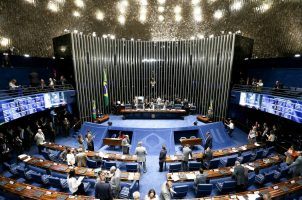Brazil Approves Revised Sports Betting Bill
Posted on: September 14, 2023, 06:36h.
Last updated on: September 14, 2023, 07:51h.
Efforts to establish regulated sports betting in Brazil have reached a significant development. The Chamber of Deputies, long eager to launch a regulated market, has approved a revised bill that provides clearer guidelines for the industry.

The updated legislation covers crucial aspects such as revenue distribution, operator requirements, and restrictions. It integrates certain provisions from previous measures and now awaits approval from the Senate. However, there has been no indication of expanded gambling.
Under the bill, only companies with headquarters and administration in the country can apply for a sports betting license. This requirement was initially discussed in earlier legislation but now has officially been included in the bill’s language, pending Senate approval.
At least one member of the applying company must also possess verifiable expertise and experience in gaming operations.
The license will cost up to BRL30 million (US$6.1 million) and will only be granted to those who meet the requirements. The fee covers just one online betting app and must be paid within 30 days following approval.
The license, issued at the discretion of the Ministry of Finance (MoF), can have a duration of up to three years and is non-negotiable and non-transferable. If the authorized company undergoes a merger or a change in shareholder control, the MoF will assess, on a case-by-case basis, whether the license remains valid.
Revenue Allocations
The revised framework also allocates 82% of operators’ gross revenues (after deducting prizes and income tax). Previously, operators were entitled to retain 95%.
Instead of 10% of the tax revenue going to the Social Security Administration, as some lawmakers had proposed, the sector will now retain 2%. Brazil’s education system will receive 1.82%, while sports organizations will enjoy 6.63% of the revenue. The tourism industry will also benefit from a 5% increase in funding.
Operators will be required to compensate clubs and athletes for using their names, brands, and other symbols. Of the 6.63% share, 1.13% must be used.
Another 0.5% of the amount will go to official state-level sports organizations. Half of this will be divided among the state’s municipalities based on their populations.
The education system will allocate 0.82% to early childhood, elementary or secondary schools that have met national assessment targets.; 1% will be allocated to public technical high schools.
The Ministry of Tourism and Embratur, the Brazilian Tourist Board, will share the 5% allocation in the tourism segment. The Ministry of Tourism will receive 4%, while Embratur will receive the remaining 1%.
The information is based on the latest available data and is subject to change as the legislation progresses.
Upcoming Ad Bans
The bill also includes provisions on advertising. Under the bill, only licensed operators can advertise within the country.
Advertisements cannot include unsubstantiated claims about winning odds or potential earnings for bettors. The use of personalities or celebrities to portray betting as a means to achieve wealth or social status is strictly prohibited.
Currently, there are no specified time periods for advertising restrictions. However, the new bill implies changes could happen immediately.
Related News Articles
Brazil Continues to Push Senate on Slow Sports Betting Movement
Brazil Senate to Vote on Sports Betting Bill
Brazil Senate Continues to Drag its Feet on Sports Betting Bill
Most Popular
Sphere Threat Prompts Dolan to End Oak View Agreement
MGM Springfield Casino Evacuated Following Weekend Blaze
This Pizza & Wings Costs $653 at Allegiant VIP Box in Vegas!
IGT Discloses Cybersecurity Incident, Financial Impact Not Clear
Most Commented
-
VEGAS MYTHS RE-BUSTED: Casinos Pump in Extra Oxygen
— November 15, 2024 — 4 Comments -
VEGAS MYTHS RE-BUSTED: The Final Resting Place of Whiskey Pete
— October 25, 2024 — 3 Comments -
Chukchansi Gold Casino Hit with Protests Against Disenrollment
— October 21, 2024 — 3 Comments
















No comments yet